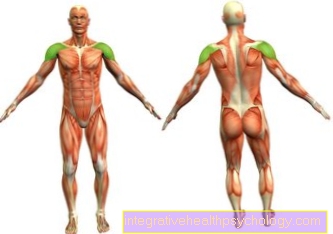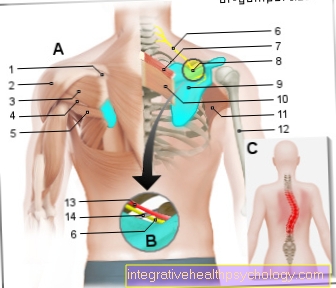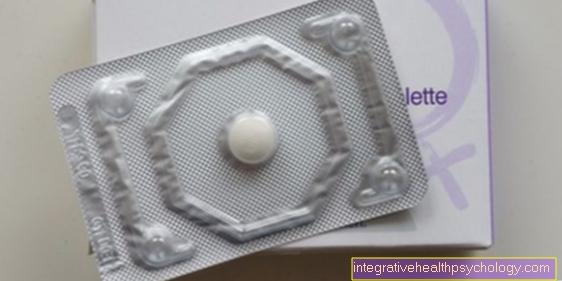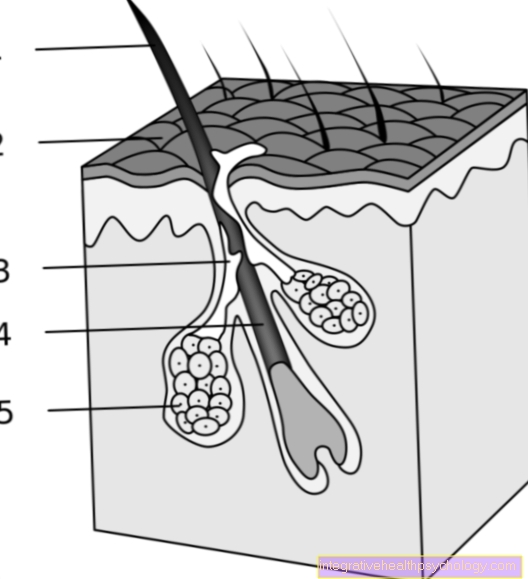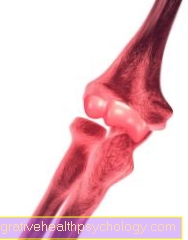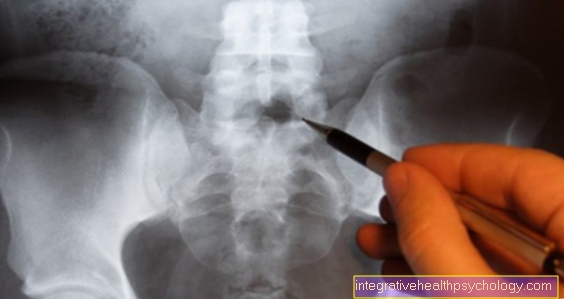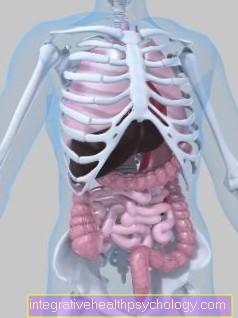Causes of dementia
definition
In Germany around 200,000 new people develop dementia every year. There are many different causes of dementia. This cause is relevant for the treatment of dementia. Some forms cannot be cured, but therapy can often slow down the natural course. However, other forms of dementia can be completely cured by eliminating the cause. For this reason it is of great importance to question every dementia disease whether there is possibly a treatable cause.
For general information see also: The dementia
Alzheimer

If a person suffers from Alzheimer's, it increasingly comes to one in the brain Nerve cell death as well as the connections between the individual nerve cells. The causes of this cell loss are still not fully understood. In various studies Protein deposits - protein particles that cannot be broken down properly by the brain and are deposited in and between the nerve cells. The nucleus basalis Meynert, a part of the brain in which the transmitter substance is affected, is particularly affected early on Acetylcholine is distributed.
This leads to a Disruption of information processing and thus to one impaired short-term memory. The carrier substance acetlycholine is also the starting point for some drugs that are used to treat Alzheimer's. Alzheimer's dementia occurs more frequently in some families. This speaks in favor of hereditary causes. In general, it can be said that the earlier the disease breaks out, the higher the risk of the relatives.
Vascular dementia
Vascular means that the vessels are involved. So that the brain can work sufficiently is a consistent one Supply of the tissue with oxygen-rich blood necessary. This takes place via the cerebral arteries, which are divided into numerous small vessels in the brain.
Vascular dementia can occur when the brain tissue is insufficiently supplied. Most often this disease arises on the basis of a arteriosclerosis, so fatty deposits and inflammatory processes leading to a Constriction of the vessel to lead. On the one hand, this generally reduces the blood flow. On the other hand, the formation of small clots is promoted, which can block the vessel. The disease usually develops gradually. Often times the individuals affected are persistent for years high blood pressure affected, thereby damaging the vessel walls.
Frontotemporal dementia
Frontotemporal dementia is initially caused by nerve cell death Frontal and temporal lobes conditionally. In this form of dementia, the presence of dementia in the direct family environment is reported particularly frequently. Studies show that many different genes are believed to play a role. Could be shown so-called pick bodies, faulty protein accumulations in the brains of those affected. In general, however, there is still a considerable need for research into the causes of FTD.
DLB
The cause of the Lewy bodies dementia is the deposition of the eponymous Lewy bodies in nerve cells. These are special accumulations of protein that are also responsible for the clinical picture Parkinson's disease are responsible.
thyroid
The thyroid can be called the body's gas pedal, it determines the speed at which the human metabolism works. A malfunction of the thyroid can therefore be felt almost anywhere in the body. Is there a underactive thyroid before, the fact that the nerve cells are not provided with sufficient energy can lead to dementia. In this case, it is essential to identify the cause and treat the hypothyroidism, as this increases the chance that the dementia will be cured.
Risk factors
There are some risk factors that can contribute to the development of dementia. The greatest risk factor is age, Depending on the type of dementia, genetics can also play a role. The so-called is also relevant metabolic syndrome, consisting of Obesity, high blood pressure, one Disturbance of lipid metabolism as well as the Diabetes disease. Another risk factor is low mental activity, while a high level of education is more of a protective factor. An increased Alcohol consumption and Head injuries also appear to be risk factors.
nutrition: Probably the brain function can be influenced by ingested nutrients. Some risk factors for developing dementia are directly or indirectly related to diet. Obesity, diabetes and increased Blood lipids promote the development of dementia. A balanced diet with plenty Fruits, vegetables, fish and preferably unsaturated fatty acids seems to have a protective effect.
alcohol: A longstanding alcohol abuse can become a dementia to lead. On the one hand, alcohol addicts are often deficient in certain nutrients. On the other hand, excessive alcohol consumption also leads to changes in the brain tissue and thus to dementia. Whether moderate alcohol consumption is also a risk factor for the development of dementia is still being researched.
Medication: The carrier substance plays an important role in the development of dementia, especially Alzheimer's dementia Acetylcholine. Since this substance is important in numerous processes in the body, many drugs influence this substance. These include, for example, drugs that are used to treat Parkinson's, Allergies and mental illness like depression. If memory disorders occur, you should therefore always check whether medication is being taken. What is important to know is that these drugs are not one dementia lead, but this is a side effect. This means that stopping use will also end the symptoms of dementia.
Other diseases: Other diseases can also be the cause of dementia. In Parkinson's disease, it comes from the Deficiency of the transmitter dopamine leads to movement disorders. The metabolism of acetylcholine is also often affected, leading to so-called Parkinson's dementia. Another condition that is associated with dementia is the Normal pressure hydrocephalus.
It comes to Congestion of brain water and thus an expansion of the inner chambers of the brain. In addition to dementia, there is a gait disorder and a Urinary incontinence to the typical symptoms. Brain tumors can also be the cause of dementia. The hereditary disease also leads to dementia Chorea huntingtonwhich usually begins with movement disorders. Infectious diseases like AIDS or the Creutzfeld-Jakob disease often lead to dementia.



